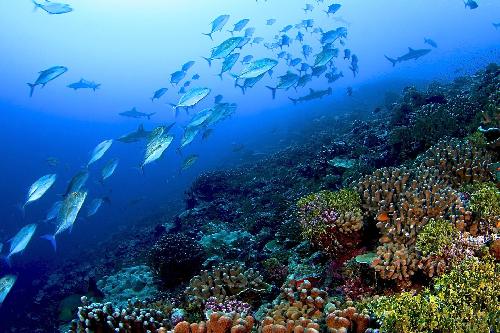Coral reefs, the world's most productive and diverse marine ecosystems, rely on a recycling program to stay healthy: The corals and algae that form the base of the reef's food web release a variety of nutrients that support a complex and efficient food chain.
But when this system gets out of whack, the cycle breaks down and endangers the coral reef's health, and a new paper in Nature Microbiology explores how a process known as "microbialization" destroys links in this delicate food chain.
Millions of people around the world depend on coral reefs to provide productive fisheries. Overfishing the waters near reefs, however, removes the primary algae-eaters from the environment, allowing populations of fleshy algae to explode. In areas with large human populations, pollution often exacerbates the problem by stimulating algae.
Fleshy algae on reefs release copious amounts of nutrients known as dissolved organic carbon (DOC), which microbes eat. Researchers have theorized that when you have lots of algae producing meals for microbes, you also wind up with higher levels of potentially harmful microbes throughout the reef's ecosystem.

In this newly abundant population of microbes, evolutionary selection pressures favor microbes that endanger corals, either by depleting oxygen from the environment or through disease. As the corals die off, the algae have even more space to take over, producing more DOC and creating a runaway feedback loop that leads to further coral death and microbes taking over the ecosystem.
As reefs are dominated by fleshy algae, "most of the energy in the ecosystem goes into the microbes," said the study's lead author, Andreas F. Haas, a biologist at SDSU. "It no longer supports the variety of reef organisms which make up a healthy system anymore."
Haas and co-author Mohamed F.M. Fairoz of the Ocean University of Sri Lanka, along with their colleagues, set out to test this theory by collecting more than 400 water samples from 60 coral reef sites across the Indian, Pacific and Atlantic oceans. Back in the laboratory, they tested these samples for evidence of "microbialization" of algae-dominated reefs worldwide--that is, more microbes with the potential to harm reef organisms.
First, they analyzed the abundance of microbes throughout their samples. Supporting their hypotheses, they found that reef sites with higher algal cover also had more microbes. Using metagenomic sequencing techniques, they found that in algae-dominated reefs, the microbial community is more likely to harbor harmful pathogens.
This pattern has implications for the ocean carbon cycle as well. One of the counterintuitive predictions made by the model is that because the microbes fostered by algal growth are voracious, they would strip the reef of DOC and limit the transfer of organic material to larger organisms like invertebrates and fish. Sure enough, Haas and his team found that in reefs with high algal cover, such as the island of Kiritimati in the central Pacific Ocean, DOC concentrations were very low, whereas in reefs with low algal cover, such as the Kingman reef in the north Pacific Ocean, DOC was higher. Across the 60 sampling sites and across three ocean basins they found this relationship held true: the higher the algal cover, the lower the DOC.
"Algae always release more dissolved organic carbon than corals," Haas said, "but in the reefs with more algae you see less DOC."
In short, the study's results support the idea that microbialization associated with increasing algae cover in coral reefs can decimate the reef ecosystem through microbial takeover.
"Metagenomics shows us that microbes on algal-covered reefs are less efficient recyclers of carbon, short circuiting the transfer of organic matter to higher organisms like fish," said co-author Craig Nelson of the Center for Microbial Oceanography at the University of Hawaii at Manoa.





Comments